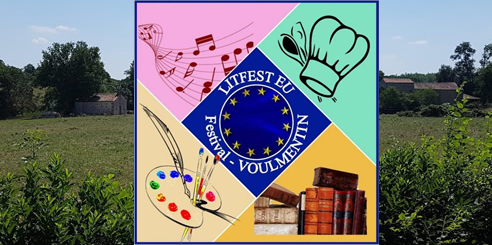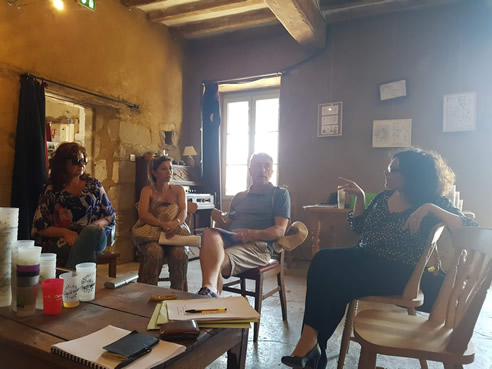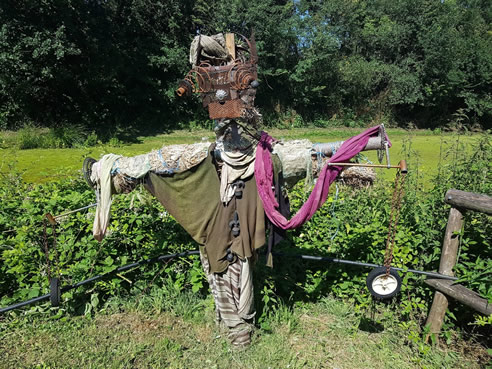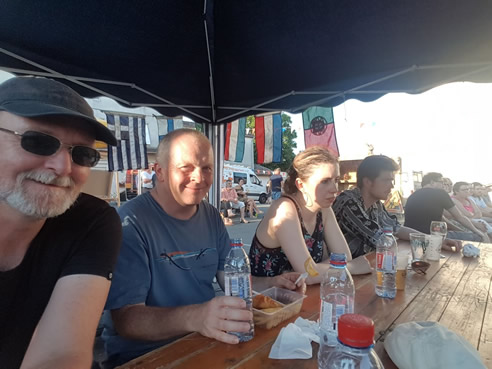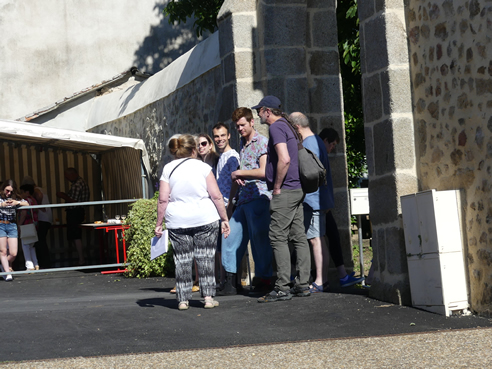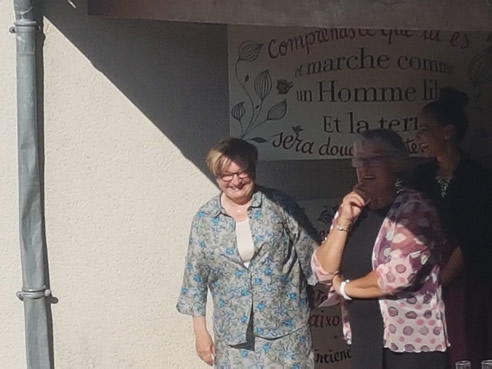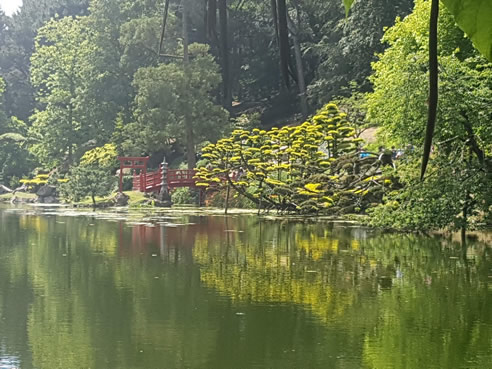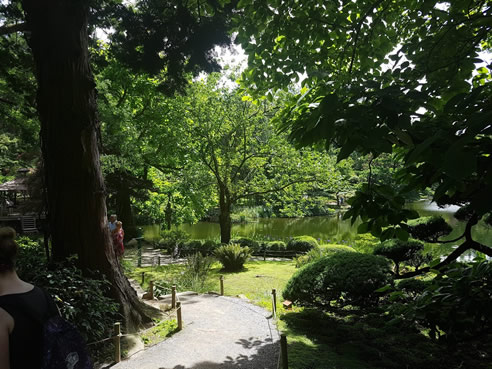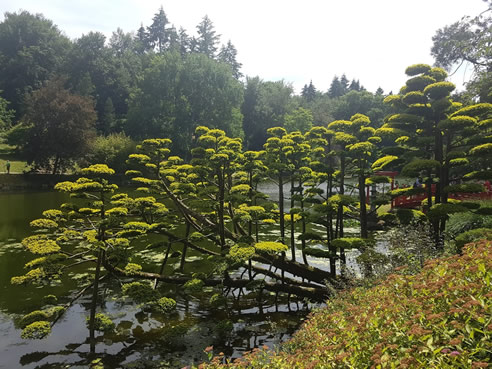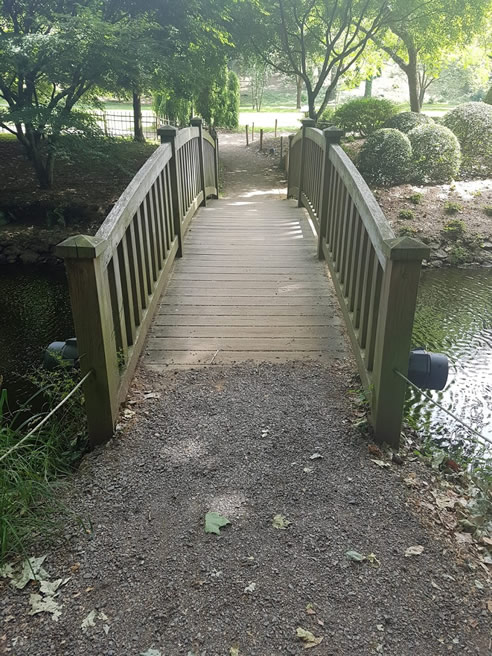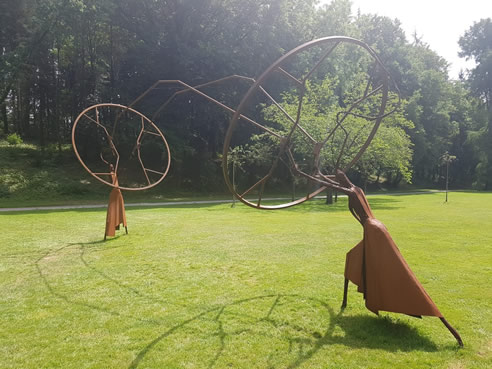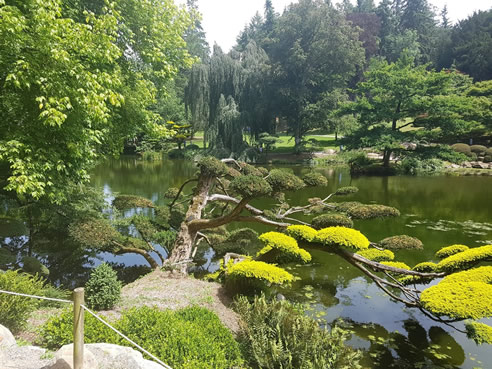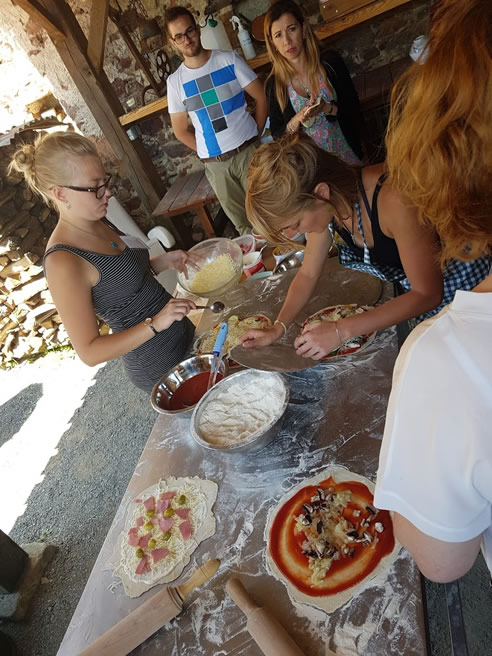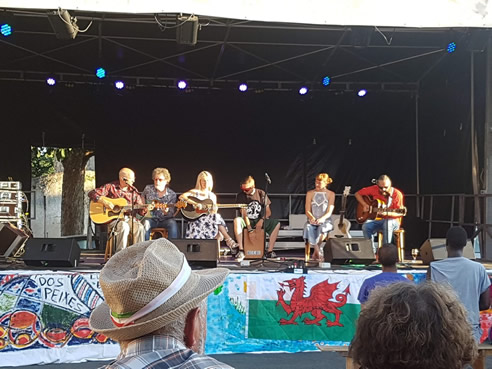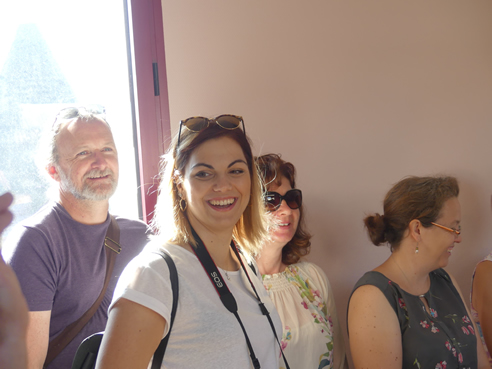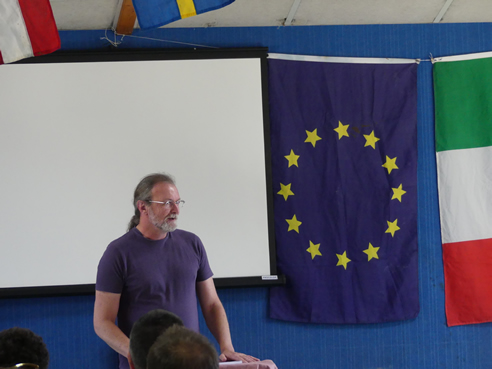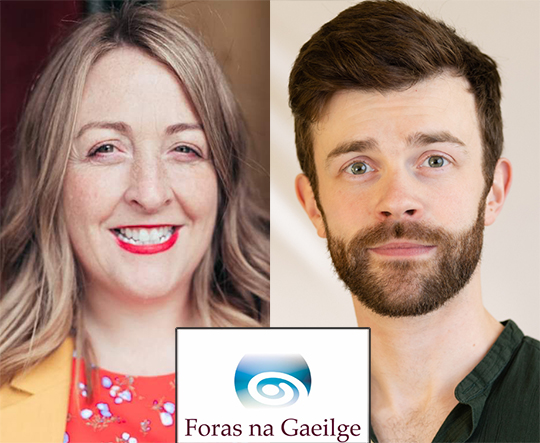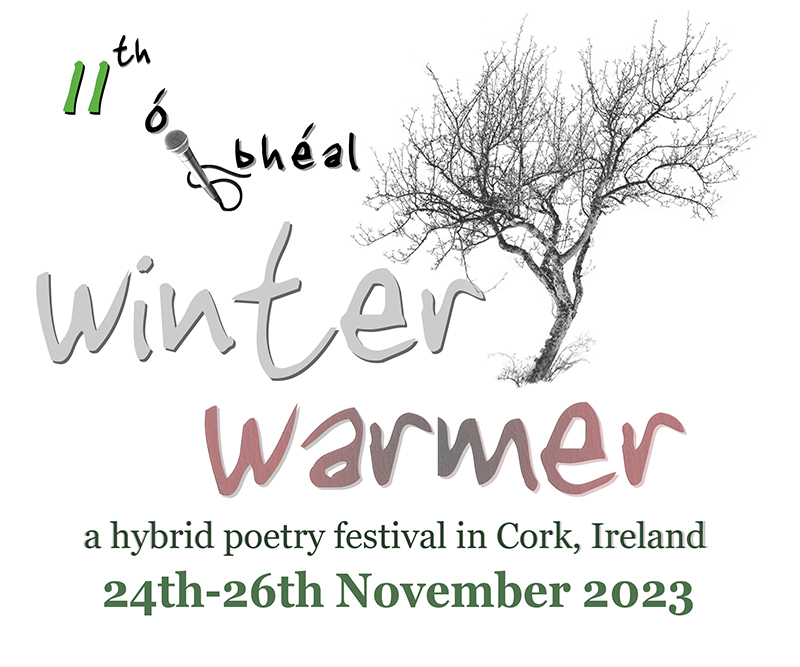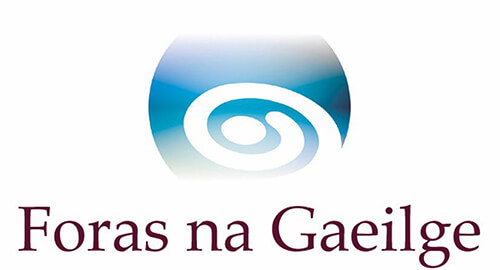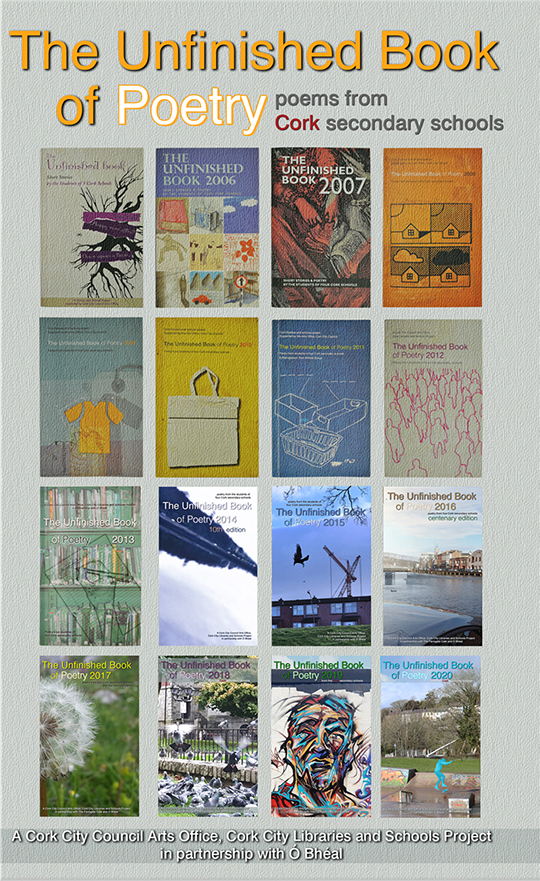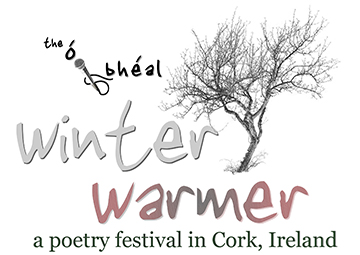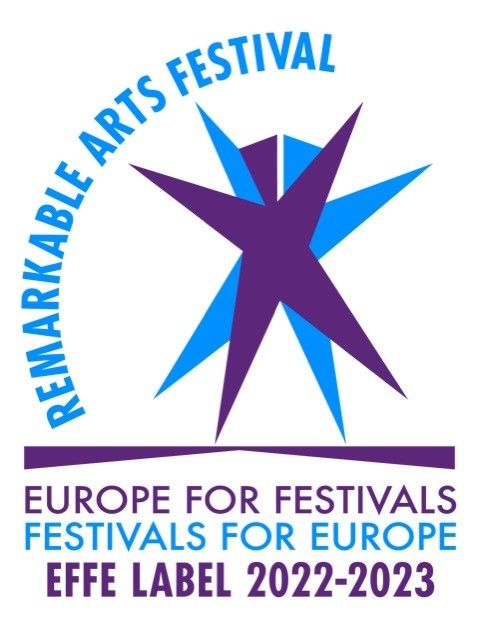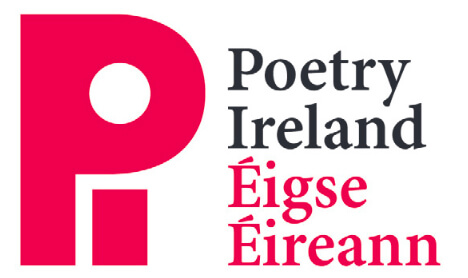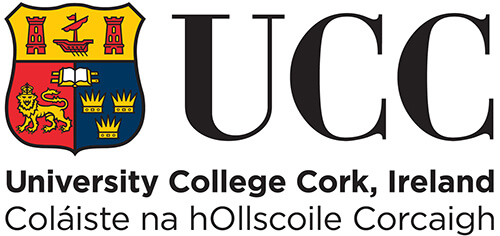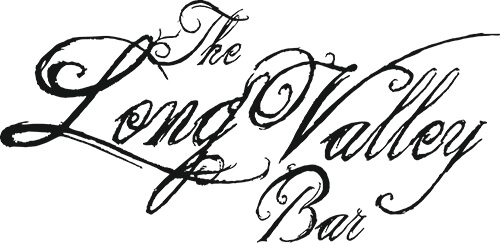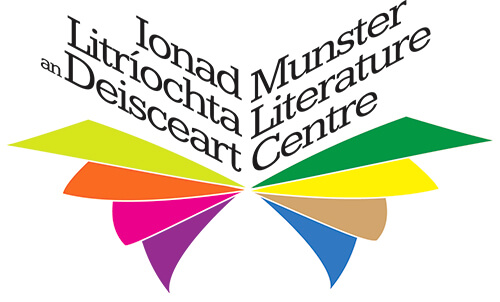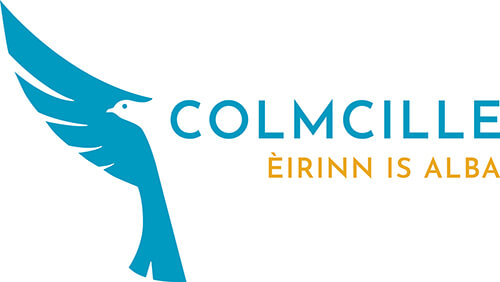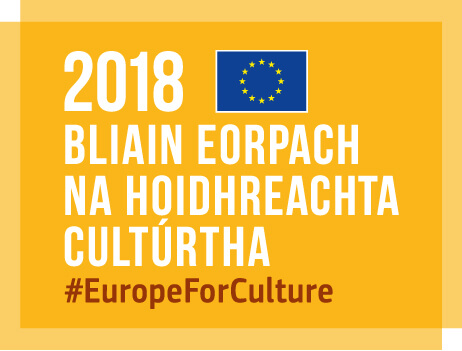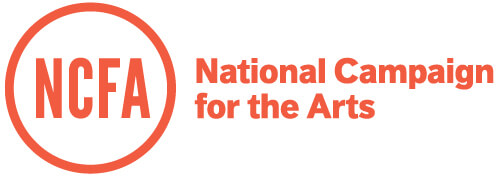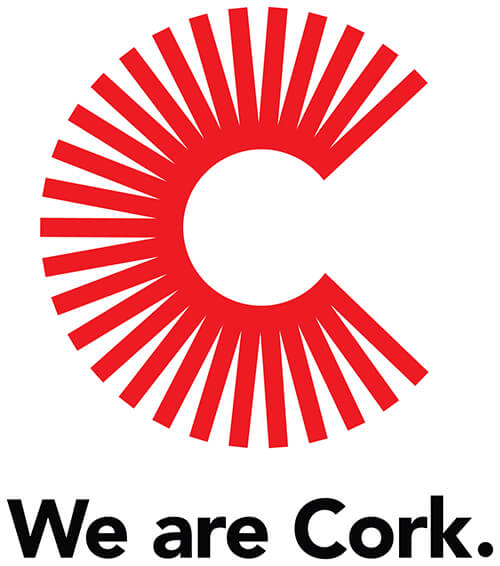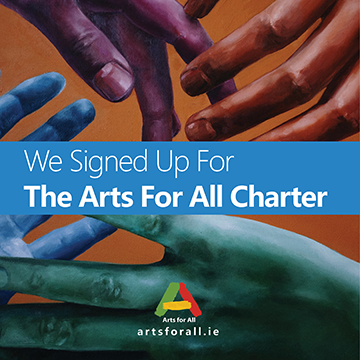(June 25th-July 1st 2018) – Voulmentin, France
hosted by LitFest.eu
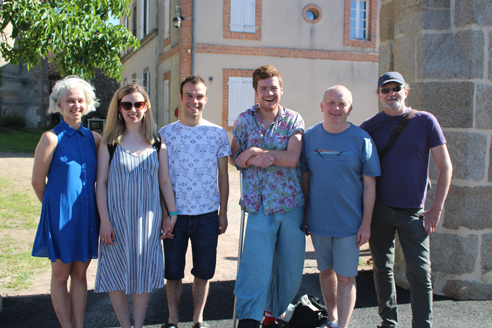
In June 2018, Ó Bhéal poets Michelle Delea, Shaunna Lee Lynch, Benjamin Burns, Ciarán MacArtain, Colm Scully and Paul Casey were guests in Voulmentin for a week in the French countryside, to take part in Festival de Voulmentin, for the second of five ECIC exchanges held with Ó Bhéal’s four European literary festival partners.
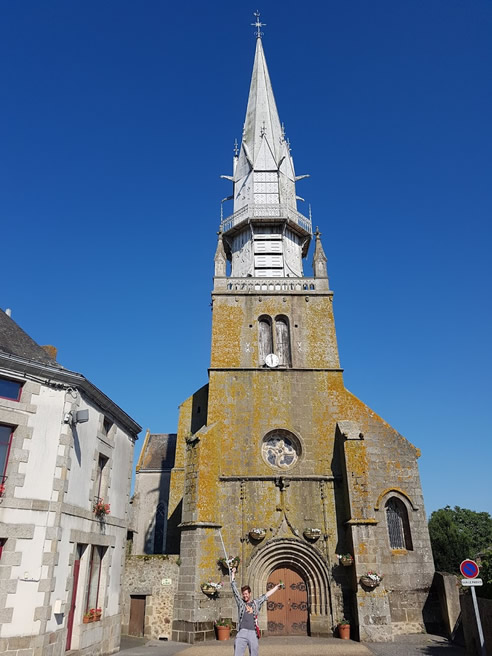
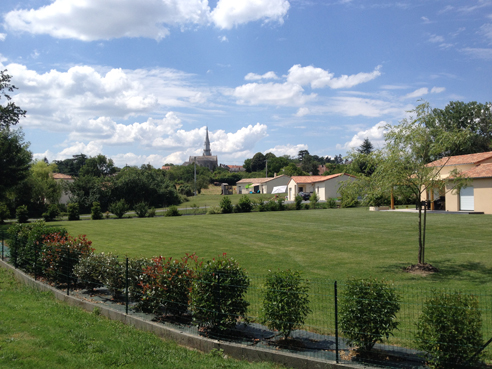
It was back in March outside the Long Valley Bar, before a reading for American students on placement in Galway, that Paul invited me to attend Lit fest 2018 in St. Clementin in the Deux Sevres region of France.
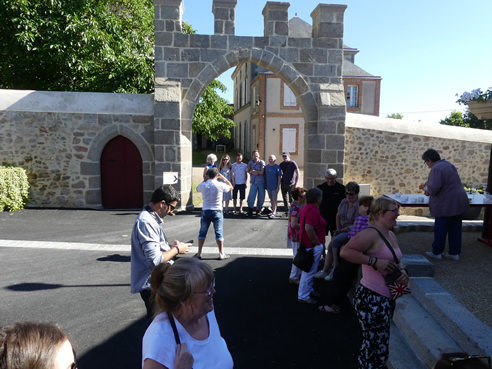
Soon I learned more about the upcoming festival, and began to understand the role we would fulfil. With the inexhaustible energy of Maureen, the festival was bringing together literary and artistic voluntary organisations across Europe to increase cross cultural connections and strengthen the bonds that have formed over the thirty years of the Erasmus programme. Bringing us together to share and learn from each other.
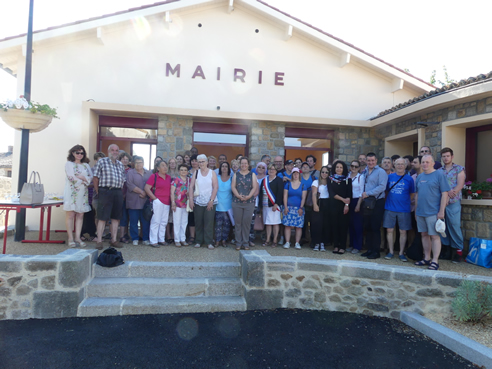
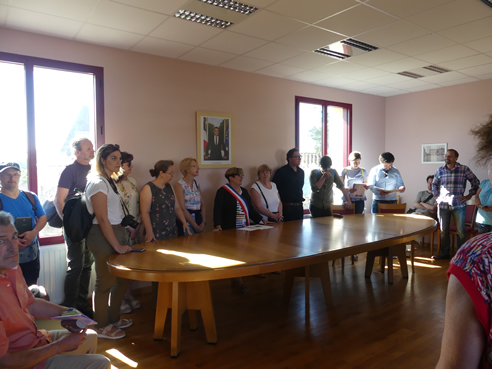
From Day 1 in the sunshine in St Clementin, standing for the official opening with Madame le Mayor, and the other partners from seven countries, it immediately struck me the benefits of the European Communities of Inclusive Culture project (ECIC). Everyone there was gaining from the experience: the participants who travelled – gaining a forum for their literary and artistic expression, the care assistants – learning from similar organisations, the English ex pats – they were helping support and becoming apart of the community, the locals – who were so friendly and welcoming, and were supporting the economic and cultural life of their ancient village. It made me feel that I belonged in Europe and strengthened my views that recent political moves towards separateness are misguided.
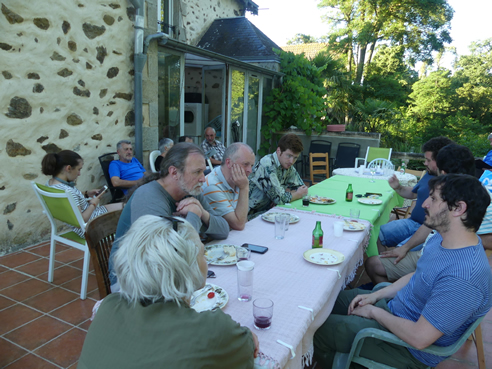
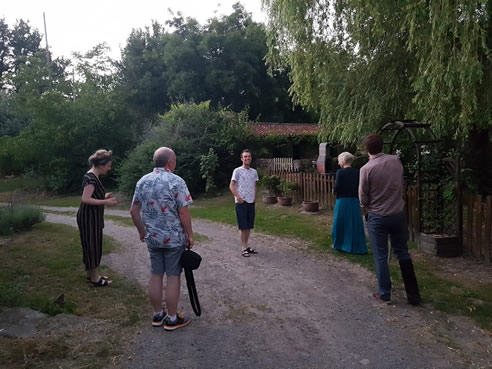
From the start we were treated wonderfully. Our hosts at Maureen’s Red Star house set a high standard. We basked in the sunshine by the river bank dining on salads and quiche. A high standard we did not expect to be surpassed. However our own accommodation in Gite le Moulin de L’Arche equaled it. There, we six from Cork, made ourselves at home in the old mill house on the River Argenton, where we would cast our minds back across the days events at the garden table, drinking a glass of local red, or savouring a vegetarian pasta prepared by the vegans and vegetarians among us. We made great use of the facilities, swimming or kayaking in the Argenton with our new friends from Welsh Connection.
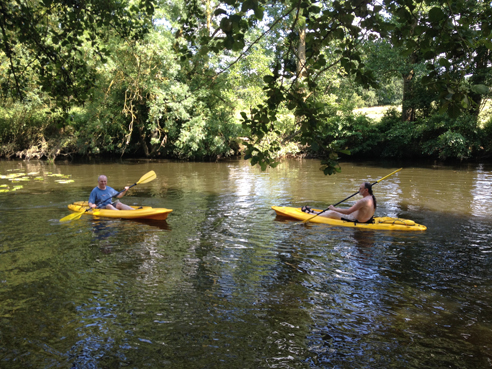
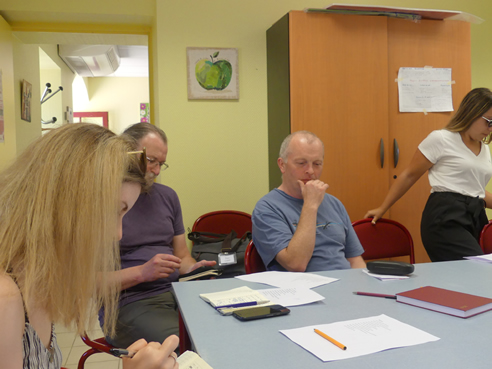
It was wonderful, but it was not just a holiday. We took part in all of the extensive activities on the agenda. The ones which we ourselves were leading, such as our reading and poetry film presentation in the cinema, and the ones others were running; such as the marvellous show about Galician poet Uxio Novoneyra, and the poetry workshop run by John Eliot.
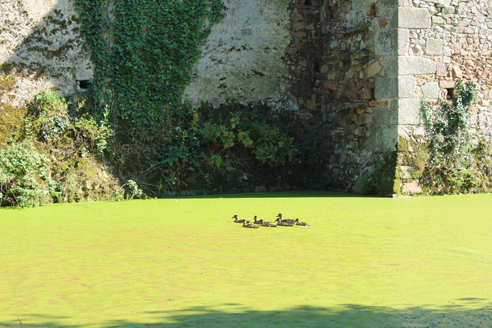
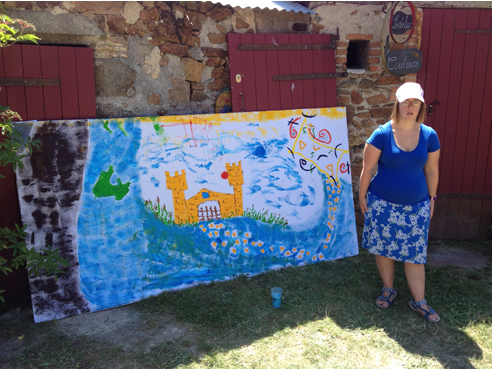
There were many highlights for me, mostly my chats with the different participants, such as Jose from Diagrama (Spain), who I was talking to during the poetry walk on Friday. He told me about his photos of the orange pickers of Seville and about the Sahrawis in refugee camps in Mauritania, who he has photographed; or the many others from Belgium, Romania, Madeira and France who I learned so much from.
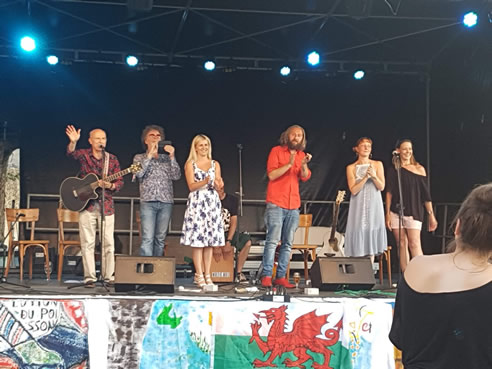
Painting at Chateau Sanzay with Lynn from Groep Ubuntu Belgium was wonderful and seeing it exhibited below the band stand when Welsh Connection played on Saturday night was also a high point. The visit to the chapel of the Rosaries, the 1000 year old church built by a returned crusader, where a few of us sang a latin hymn to try to recapture the resonance of the past, was also memorable.
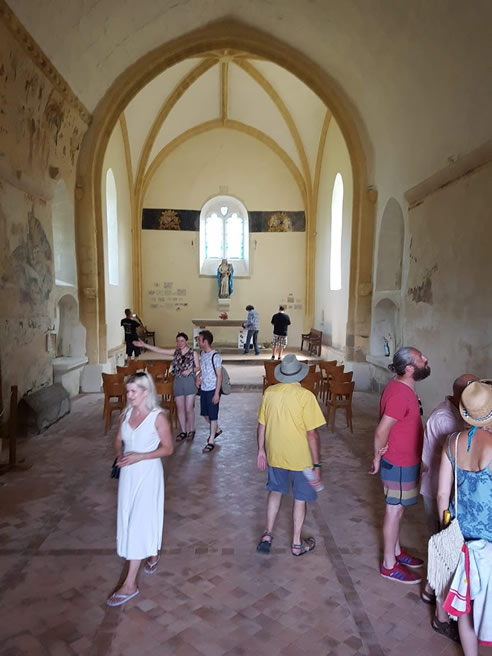
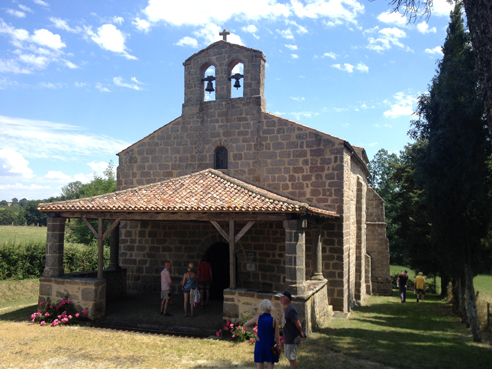
I had a wonderful time and I learned a lot. I even rose to the challenge and wrote some short poems in the Japanese gardens, inspired by the stories told by the guide. I hope you remember the references.
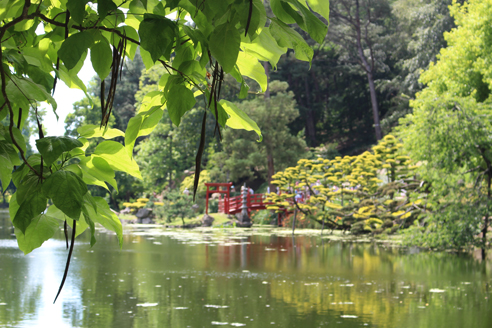
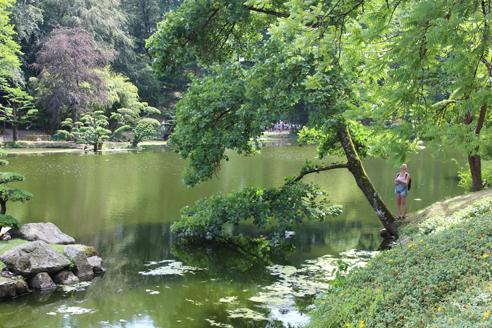
Borrowed Scenery
I
Marcel borrowed the owner’s daughter,
the viaduct and the Chateau.
Newlyweds borrow the sacred bridge,
their image reflected in the pool of serenity.
II
The Irish Yew tree
mushrooms above me.
I borrow its shade.
III
Moles burrow in the lawn
A spider frog under the azaleas.
At the café a butterfly dances
from the toilet roll dispenser
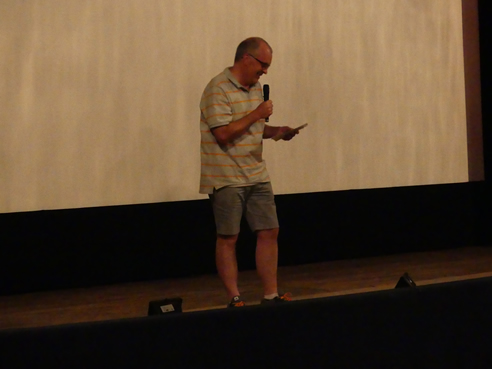
I brought my camera and have included in the mix here a selection of photos I took during the week. And thanks again to Paul, Maureen, Rene and all involved for a wonderful experience, which reinforces my belief in the ideal of Europe and the power of Art, Poetry, community and life long learning.
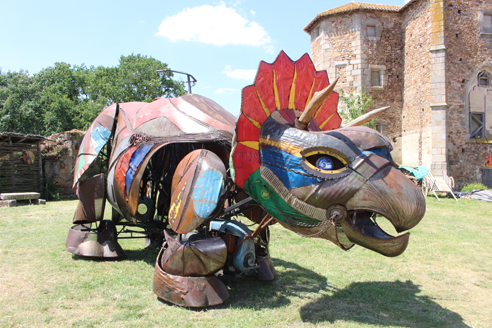
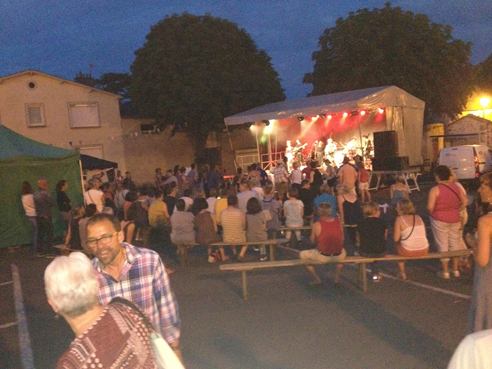
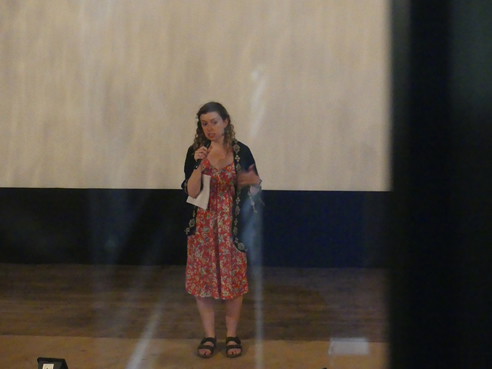
After a pleasant Monday afternoon flight we arrived to sunny Nantes. It was a real treat to get collected from the airport and get driven to St. Clementin. The summer breeze combined with views of the French countryside was a splendid refresher from travelling. We arrived to Maureen’s home to a full house. She had a marvellous spread of food prepared for the guests. As we ate we were briefly introduced to some other guests there apart of the ECIC partnership, it was very interesting chatting and getting an idea of the other festivals and their initiatives.
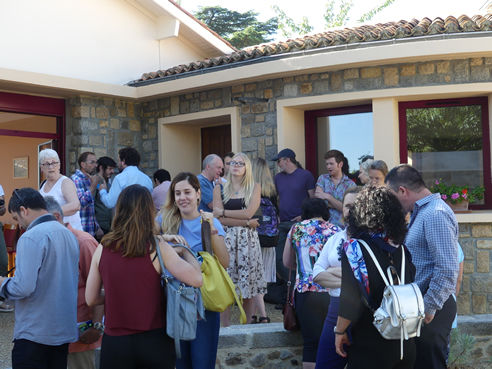
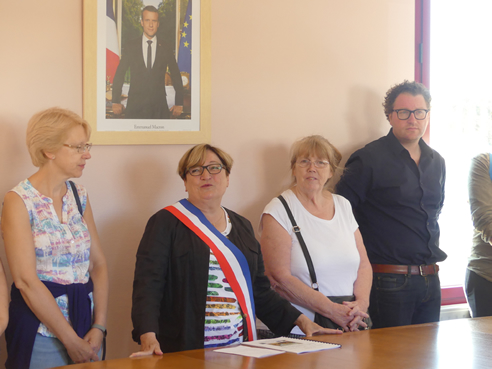
The following day they launched the beginning of the festival with an opening ceremony led by the mayor, followed by a more formal presentation from all the partners. This was particularly interesting as we got to learn more about each group apart of ECIC and the partnering GALA (Gentle Art, Living Art) Project. It was nice to hear more about how each group was founded and their aims and objectives. Each presentation was translated into English, which was considerate and also a reminder how beneficial it is for one to be multi-lingual. This is something I considered a lot through out my stay in St.Clementin. Mostly when travelling it’s as a tourist and translations are readily available, unfortunately one can get lazy about learning other languages. It was great to have the opportunity to stay in a more remote village and work around the language barrier with the locals. It has definitely motivated me to learn the languages of our neighbouring EU countries to converse courteously when travelling.
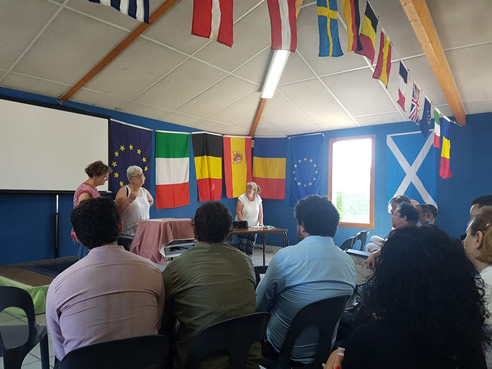
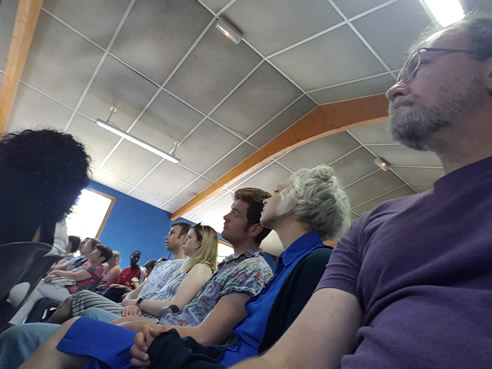
That afternoon we went to a ‘Reimagining, Rewriting, Reinterpreting’ writing workshop. We heard some of the workshop leaders poems and then were given an exercise to work lines from different texts into an original poem or piece of writing. It was interesting to get lines I wouldn’t particularly have chosen for myself and then remixing them into my own style of writing for example. It was scheduled from 13.30-16.30 but participants were given the option to leave when they had said their poem. I think this did the session injustice as not everyone got to hear all of the poems. Although it was understandable that some people may want to leave as not everyone was there for poetry, perhaps a structure more contemplative of this would have been better so those who did use most of the time allocated could share their work with everyone. It was nice to have that time allotted to just write in silence with no technological distractions all the same.
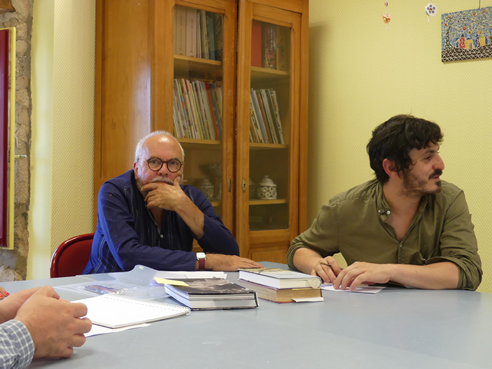
Wednesday began with some more presentations from ECIC partners to give us more detail on what each of the respective festivals’ entail and how they organise events of that scale. Some partner’s information was more thorough than others, this may have been due to a language barrier. I particularly enjoyed the presentation by Uxio Novoneyra as I learned a lot about not just their festival but the history, nature and life in Galicia. That afternoon we went to the Japanese Gardens and had been given the task of writing a poem there, which was to be presented later in the week. Ultimately the presentation of the poems never came to fruition which was a bit disappointing as we were eager to share our work with the others. It was beautiful there and an inspiring place to write.
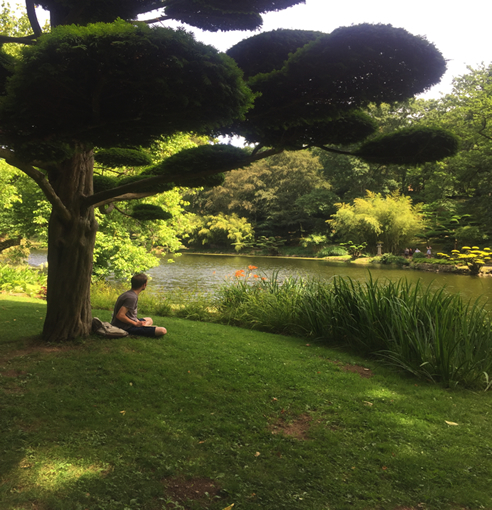
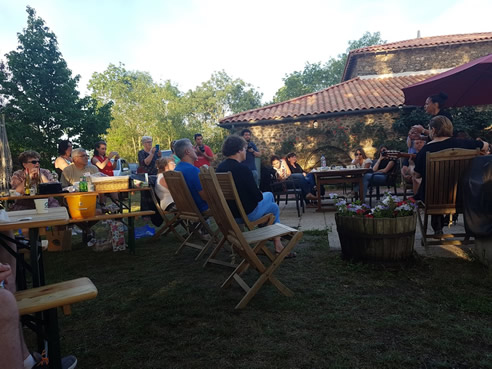
That evening it was organised for us to go to a dinner at a private home. Unfortunately some of us were unable to eat when we got there as there was not a vegetarian option, this was as an issue throughout the week with catering and is something to consider improving in the future.
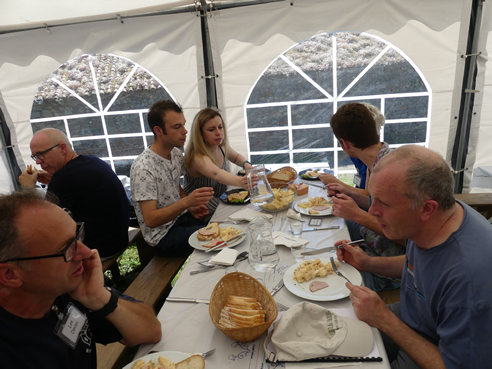
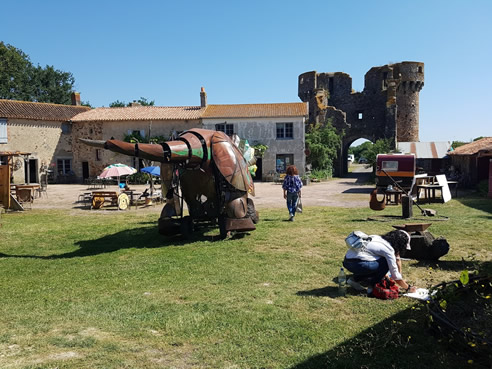
Thursday we visited Chateau Sanzay, a wonderful local community project, home to a castle, various workshop facilities and a radical triceratops made out of metal. That evening we went to the cinema in the town to see Ó Bhéal’s poetry films and read a couple of our poems. A lot of my poems reference people or situations particular to Irish society so I was interested in seeing if this would translate culturally to a non-Irish audience. It was thoroughly enjoyable seeing poetry films on a full cinema screen and really heightened the viewing experience.
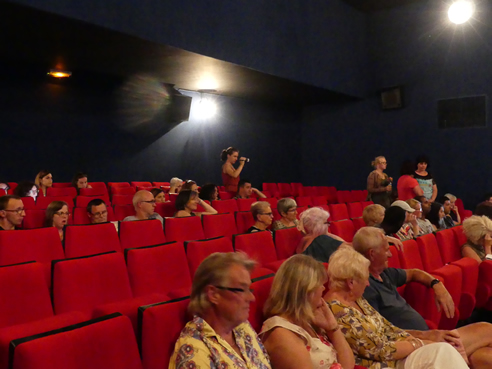
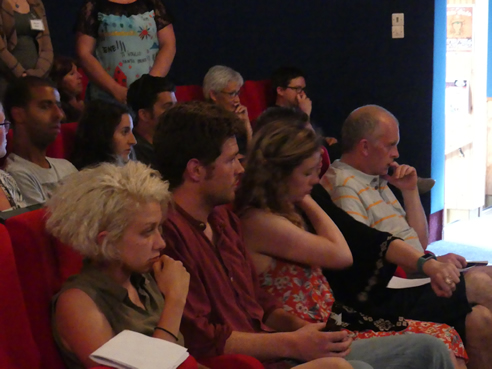
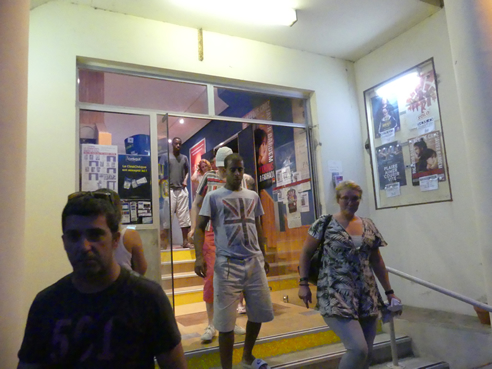
We were most enthusiastic for Friday as this was to be the day the festival was the public programme that launched Ó Bhéal’s five word challenge, followed later by poetry workshop and the open mic. When we got to the venue, everything had been pushed back due to a hold-up of a steering meeting. I thought this was a poor decision to push back scheduled public events for a private steering meeting. This delay seemed to throw the day off course as when the steering meeting did eventually happen it was excessively long and those who weren’t at it where left waiting in the lurch wondering if the events were going to go ahead. This caused some confusion and tension amongst the groups. However, one event did go ahead on time, “The Awe”, a fabulous piece of theatre presented by Inacio Vilariño from the Uxio Novoneyra Foundation. It was really inspiring work telling the stories of Novoneyra’s poems.
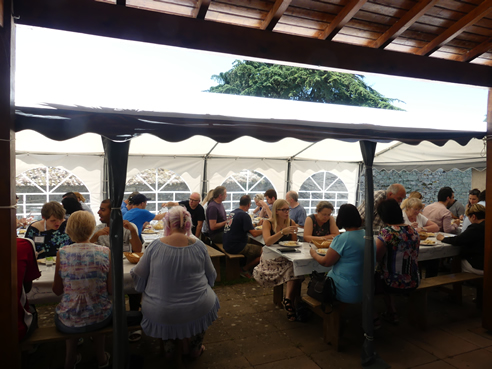
Ó Bhéal’s poetry event went ahead eventually, albeit quite later than expected, in a different venue. It had a more informal setting which at the beginning I expected to be a hindrance but actually brought a new, very interesting element to performing our poems. It was a successful and surprising event, igniting some new ideas for my poetry. That evening we joined forces with the Welsh musical guests in the village square. An informal jam turned into a really special music & poetry collaboration.
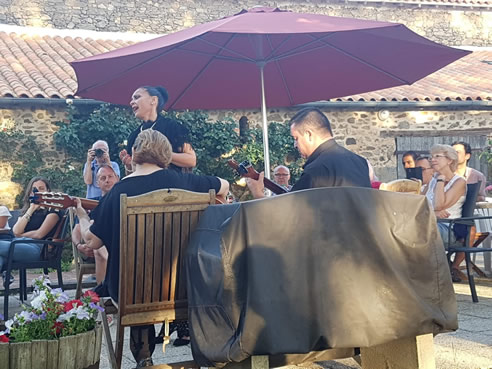
The rest of the weekend the events were not compulsory so we could go at our leisure. We saw some great music and met very interesting people. From listening to Portuguese Fado music performed, meeting members of the GALA project, learning about the organisation of such admired festivals and having the opportunity to reflect on ones own work and create new ideas, it was a thoroughly amazing experience which I am so grateful I had the pleasure of experiencing. Clarity on the organisation of events, time-keeping and more attention to dietary requirements are something I’d suggest be looked into for future festivals. It was a great learning experience. I look forward to meeting the partners again when they come to Ireland in November.
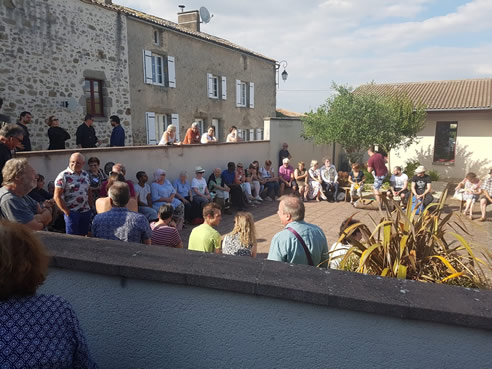
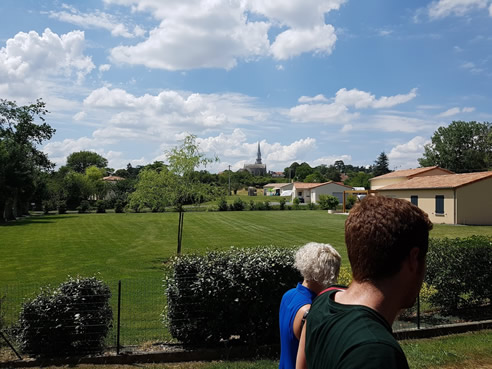
It was a great joy for us to travel to the French countryside to take part in LitFest: Festival du Voulmentin. We had looked forward to the trip a lot, curious to the particulars of what would be involved and where we were going. I had been in a nearby area of France, a little north, in The Loire Valley, in August 2016 and was excited to return to the area, this time with a troupe of wandering poets!
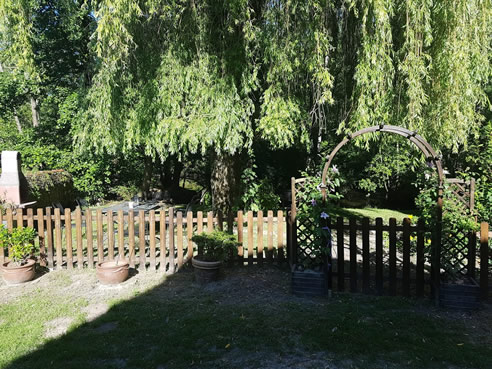
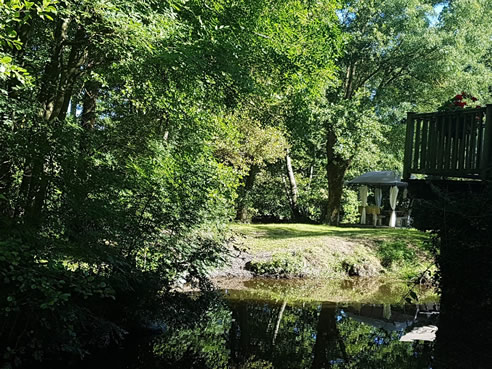
After being collected from the airport we were brought to La Roche aux Moines to be hosted for a delicious dinner by Maureen and Dennis Walby at their home. It was a chance to meet other festival participants and the first sense we got of how diverse a festival this was set to be. The range of languages spoken and nationalities represented on the terrace gave a real sense of excitement for the coming week. We got a full tour of the premises too which introduced us more intimately with our idyllic surroundings. Soon after, we were taken to our own gite, where we’d be staying for the week. It was stunning, really beautiful set up down by the river with plenty of space for us all and scenic countryside all around. We couldn’t have had a nicer platform to go and explore the festival for the week to come.
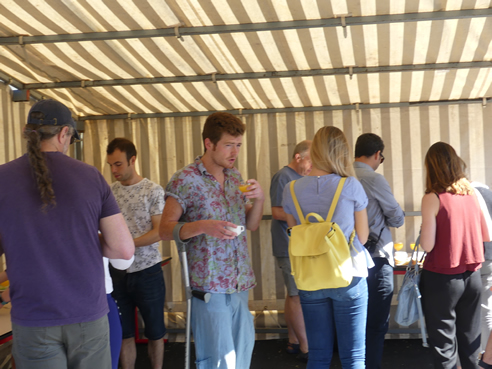
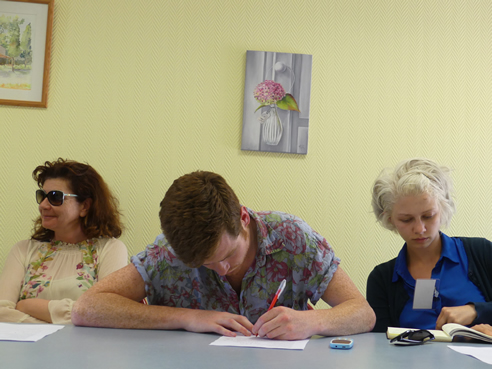
The first few days of the festival were enriching both from a personal and professional point of view. Being part of the festival as a representative of Ó Bhéal was a real honour and enabled me gain great experience as both an artist and as an arts administrator. It was hugely valuable for me to get a sense of what is involved in the executing of such a large scale festival with multiple partners. Perhaps on paper, the administrative side of the trip wouldn’t be something as enticing as some of the other events we were involved in, but it’s here I really felt there was much for me to learn regarding my line of work as an arts producer. The personal and social elements of these opening few days of the festival were also joyous. The six of us from Cork had already been close before leaving and this led to their being a really positive energy in the group. We were also delighted to engage with so many new people from all over Europe from a variety of different social and artistic backgrounds.
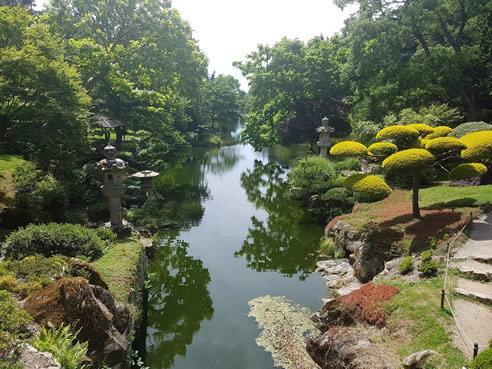
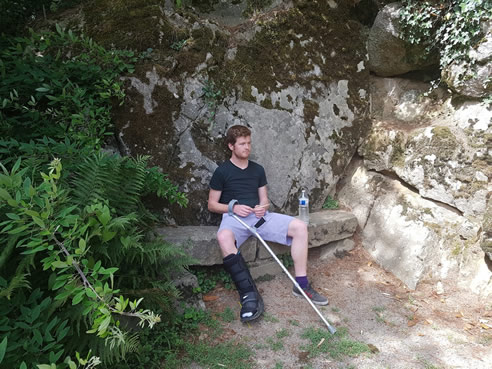
Thursday was the day of our first performance and Ó Bhéal’s first major contribution to the festival. We’d been out in the wonderful Chateau Sanzay for the afternoon. The castle and its staff have the most infectious energy! A host of different workshops were held for participants to enjoy while festival organisers met for the afternoons’ steering meetings. We were all afforded some down time after lunch which enabled us prepare a bit for the evenings’ readings. We were to read in a 1 screen cinema in nearby Augmentin, with 3 readers a piece book-ending an hour of poetry films. We were well taken with the venue when we got there. A beautiful space to read! It was also definitely interesting reading to a multi-lingual audience. It was most interesting to experience poetry-film and live poetry performance in the same space also. There was a really positive re-action to the event and we were each proud of our contribution to it. It was nice for me to be able to read some poems in French, considering some were written not far away from where they were being performed! It really exemplified the important impact the region has had on me at different times in my life.
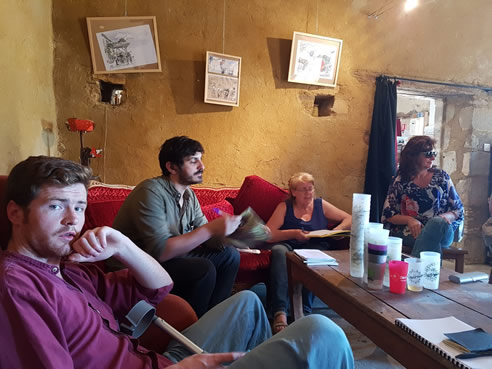
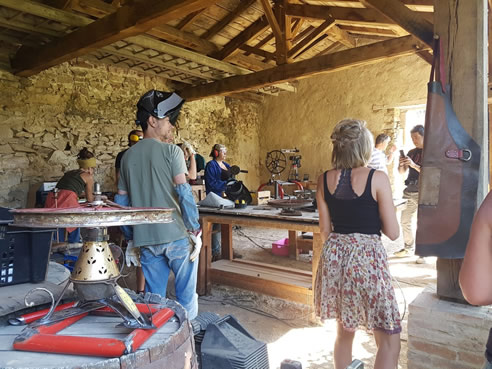
Friday was scheduled as the first public day of the festival. We were due to read that afternoon. As with any new (or re-modelled) festival there can be some teething problems. A few logistical issues changed the nature of our Friday performance. In the end however, it turned out to be a very pleasant reading in a slightly more informal setting than we’d expected. Michelle hosted the 5 word challenge and we were delighted to hear responses in different languages, as well as a few contributions from dedicated non-writers. Following this we performed poetry in the round, where we’d each say one poem at a time and went around the circle a number of times. This was a change from how we’d expected to read but definitely created an interesting flow between the pieces. The more informal nature of the reading also enabled each contributor to be a little more playful with their performance than perhaps previously thought.
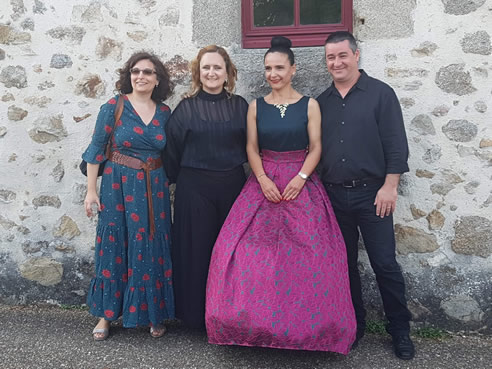
As the Friday afternoon performance was our last responsibility to the festival, the weekend brought a bit of a change in energy in the group as we were free to enjoy all the festival had to offer. Here we were really able to build friendships with participants from other places and enjoy each others’ company. There was such a positive energy around the town on Saturday, with the sun beating out of the sky and a series of great performances on the main stage. France had just beaten Argentina in the football as well, which only added to the carnival atmosphere. As the mid-week events were largely only for partner organisations, the weekend events really opened the festival up to the public. It was so great to see locals of all ages come out and enjoy the entertainment. It is so special for such a small community to have access to international performers, who bring so much diversity to the cultural life of the area. On the other hand, it was an absolute pleasure to be hosted by the village and its warm and welcoming population.
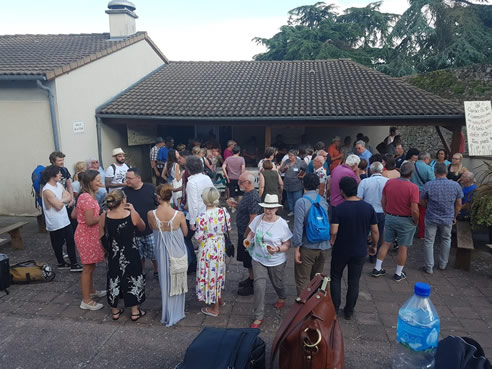
Both Friday and Saturday nights’ ended in excellent sing-songs outside Chez- Didiers, the local restaurant/ café/ bar. Didier and his family had been so good to us all week and it was really special to share his birthday with him on Saturday night. There were songs and poems shared between us in a really raw and quite magic cultural exchange! It really captured the essence of the festival. To have work shared in new environments and have it appreciated by those with no previous access to it. The organic way in which this collection of performances came together and were celebrated cannot be put into words. It is something that can only be experienced. It was truly an honour to contribute to and share in this festival and I thank the organisers, each partner festival, Maureen, Ó Bhéal and Paul Casey for allowing us the experience. Until next time!
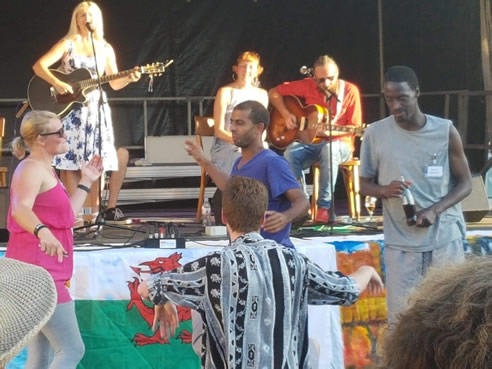
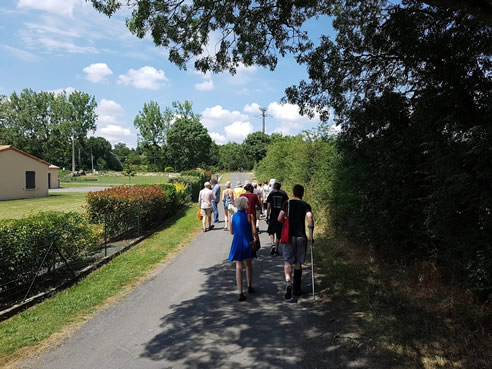
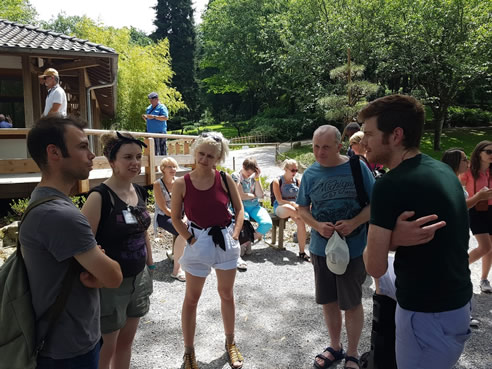
On arriving in the charming town of Voulmentin, a place created by the merging of communes Voultegon and Saint-Clémentin, our Irish group of 6 were acquainted with some of the festival groups at a long picnic table at our hosts’ home. Prior to our flight, I – with the use of Street View maps – eagerly tried to get a glimpse of own temporary home in the French countryside. I knew it was a good sign that the Google van couldn’t get anywhere near it. Peering through the bushes in the heavily pixelated screenshot of a moving, rotating camera, rewarded me with a cropped corner of a blurry rooftop, enough to pacify my patience for the journey. Finally crossing the point the van could not, we had arrived at the 19th century miller’s house on the banks of the Argent River, ready to welcome the week of creative work.
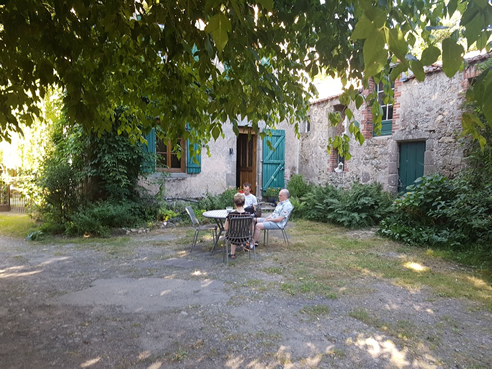

The festival opened with each GALA & ECIC group introducing themselves. It was clear that the expansive range of practices and passions among us would make way for a fruitful collaboration. The room collectively made efforts to translate for each other when necessary, and this gesture continued kindly all week. The programme was dense with versatile events, which itself could have been more concisely presented. Poor punctuality caused some events to be delayed or canceled, also inhibiting the potential gathering and communication between us. However, given the ambitious amount of activities, there were surplus opportunities to reconvene.
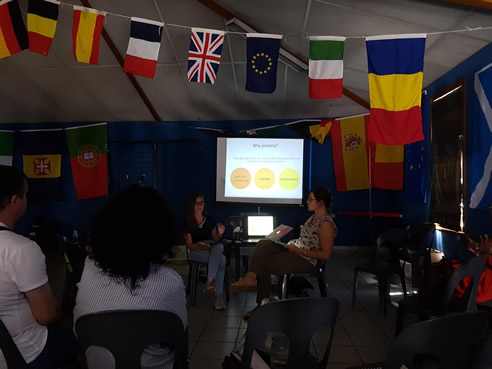
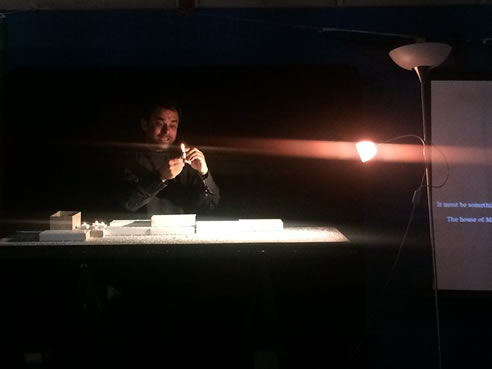
The community hall was fantastically utilised, housing the performance of literature-based theatre from Galicia, mosaic workshops, a local book-swap fair, an interview with a well established Welsh film-maker, our own 5 word challenge poetry competition and also, our daily lunch where we gathered in its marquee.
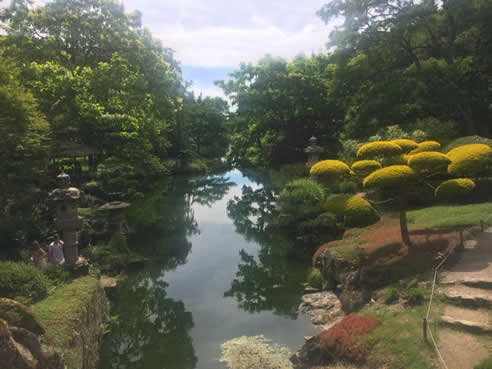
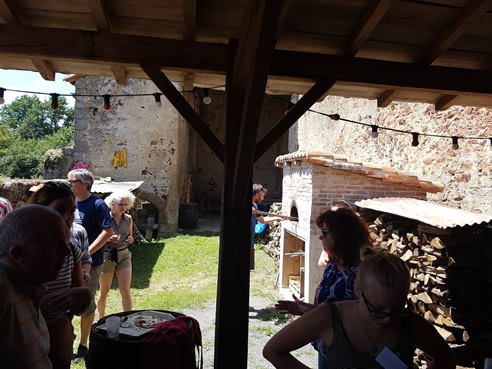
Excursions to the Oriental Gardens and Beaufort Castle allowed us to explore different realms of creativity. At the castle, workshops were given in candle making, bee-keeping, cooking and painting. Artists and sculptures threaded around this near-utopian workshop, as the curators of the space theatrically told us the story of how it came to be. This was a beautiful opportunity to better understand the local community’s ethos, and spend valuable time with each other in the process.
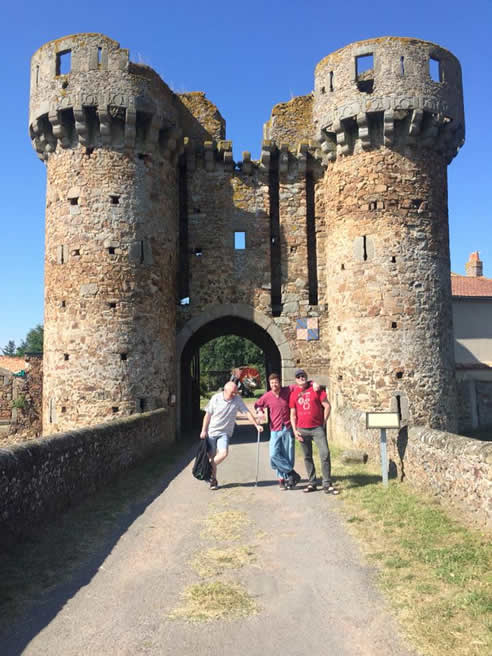
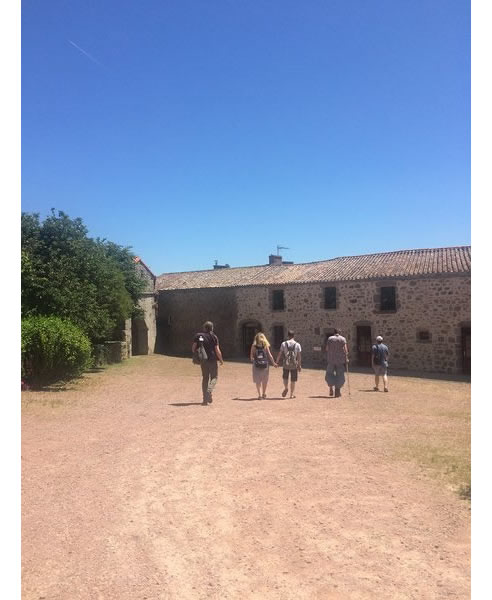
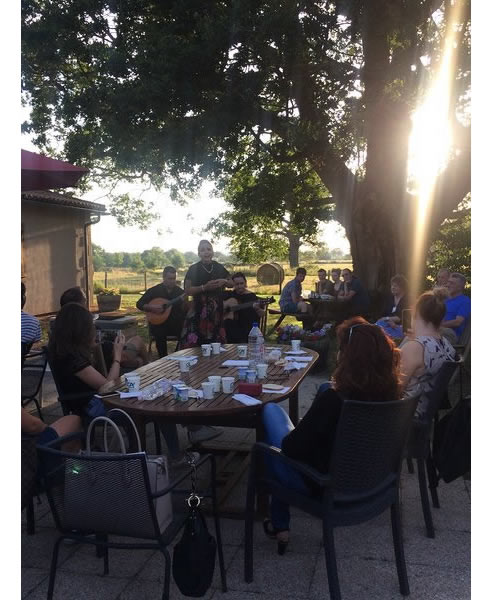
The town square grew more populated each day with dance workshops at the weekend until it was at once a great gathering of each generation, enjoying the performance of headlining musical acts. More informal sharing of the arts would ensue, where the respect towards it led to songs, poems and stories surrounding us and being withdrawn from us until the early hours. This very special quality to its nature is something I will recall always.
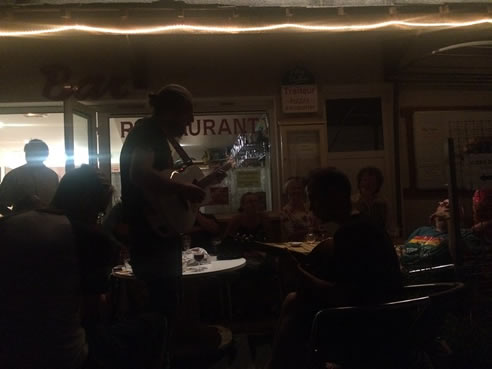
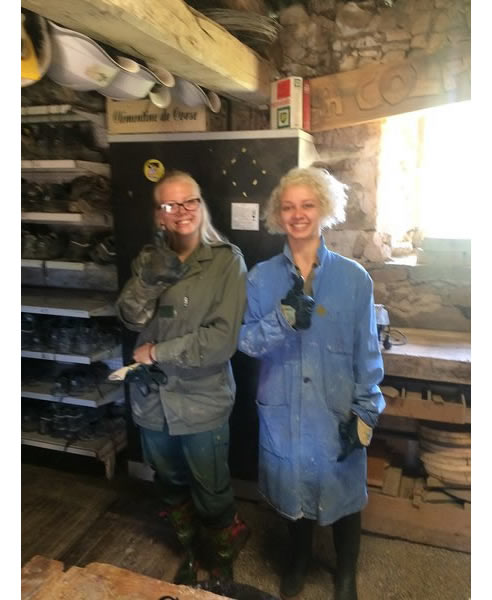
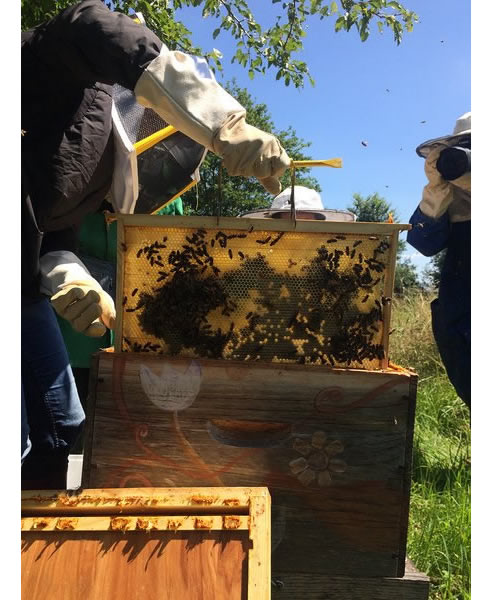
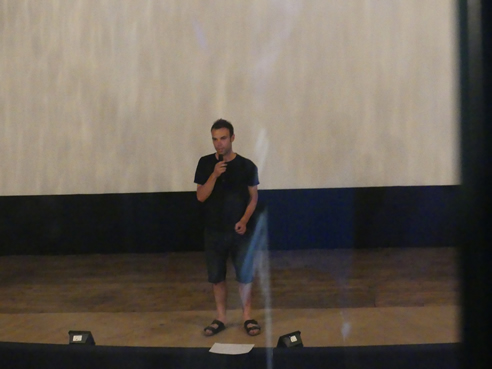
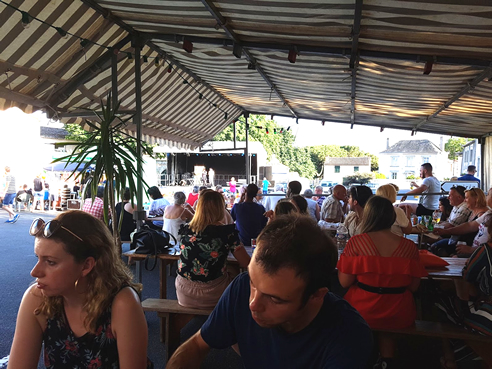
St. Clementin was a beautiful setting for the festival. Swifts screeched in the clear sky above the hot, peaceful village. Crickets whirred like coasting bicycles in the fields and hedgerows. Tall trees swayed in the sunlight. It was a pleasure to be in the countryside. The accommodation we stayed in was wonderful: an 11th century Mill house and Granary, with a willow garden, a water meadow, a verandah, and seating by the river. Our hosts were very considerate, making sure the house was well supplied with food and beverages. The river was fantastic for swimming, and we also had the opportunity to take the kayaks out. We were bedazzled by bright blue dragonflies with black mascara wings, and by mayflies coupling ostentatiously about us. In the evenings we shared glasses of wine, engaging in conversations on art and politics long into the night.
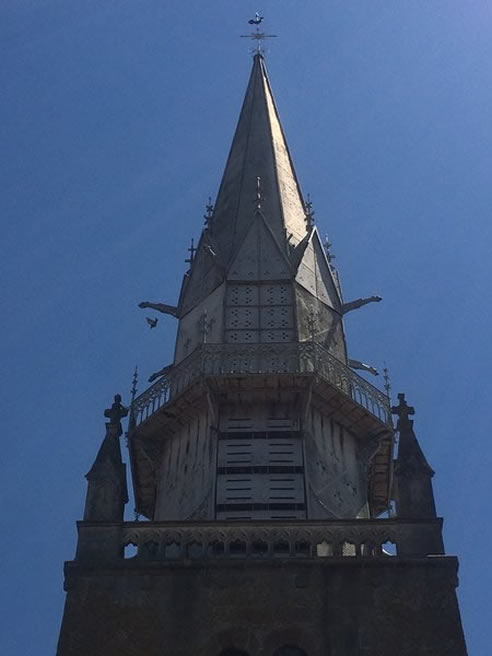
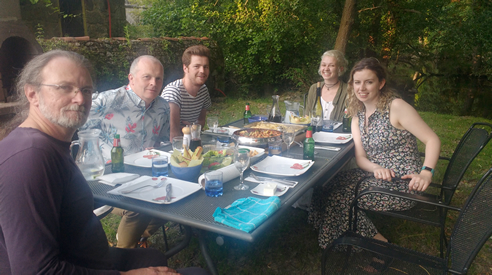
It was wonderful to meet so many new people from different backgrounds, travelling to the festival for different reasons. The Galician group brought an enjoyable sense of humour and a passion for the poetry of Uxio Novoneyra that rubbed off on us all. Their dramatic performance of Novoneyra’s poetry was an inspiration in terms of how such minimalist set design and production could achieve such visual and emotional depth. The Madeiran group brought their lively, passionate Fado music. The Welsh musicians who arrived on Friday evening were a fantastic bundle of Celtic energy. We jammed with them long into the night on Friday and Saturday outside Chez Didier, St. Clementin’s little café/bar. I enjoyed hearing their songs and joining in on the guitar. We responded with performances of our poetry, which they accompanied in turn with music. The impromptu spontaneity and free playful energy of the sessions reinvigorated me as a musician and as a poet. This was one of the highlights of the trip. Over the course of the week Didier, the owner of the café/bar, regaled us all with his cheeky wit. It was his birthday on the Saturday night and at the session he performed a stirring and suitably unique version of ‘Comme d’habitude’. It was also a pleasure getting to know the people I travelled with better. There were exchanges of jokes, pleasant and meaningful conversations, and lasting connections made over the course of the week.
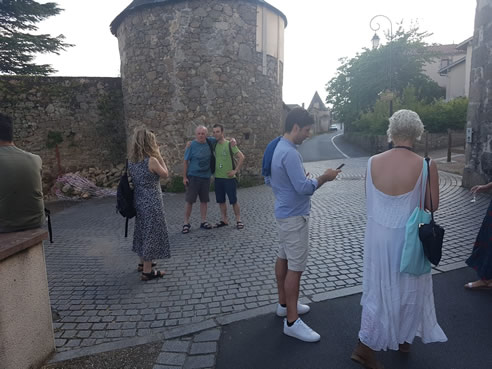
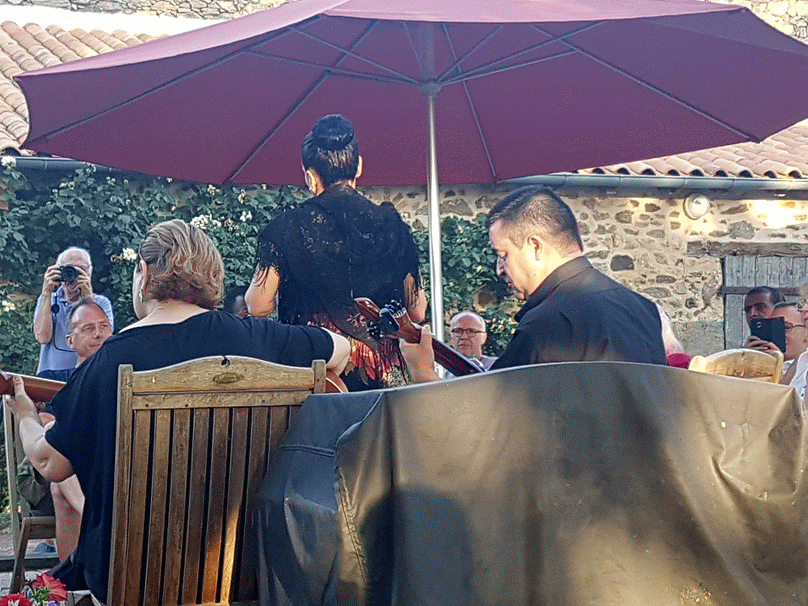
Maureen and Jean-Renée were fantastic hosts who brought all of their passion to the festivities and made sure everyone was well catered for. Whilst the run up to the festival was very well organised, with all of the events and workshops happening as planned, this organisation seemed to fall by the wayside once the festival opened to the public. A steering meeting which didn’t happen on time ended up taking precedence over the opening of the festival and a number of public events, causing confusion and some frustration amongst participating groups. The festival was wonderful for the people involved in the GALA project, particularly the groups from England and Belgium. They seemed to get a lot out of the workshops they were involved with, and loved the music and dancing.
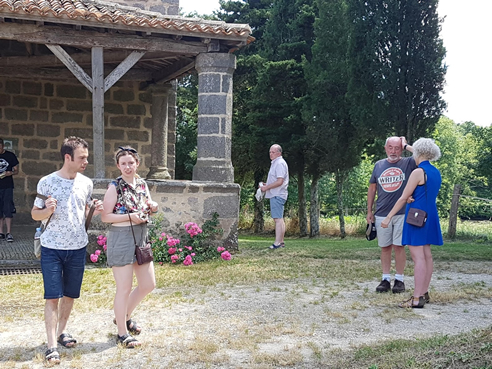
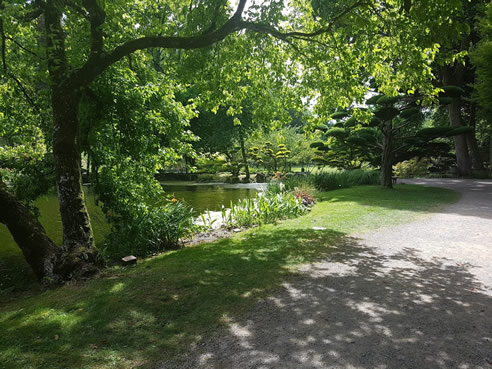
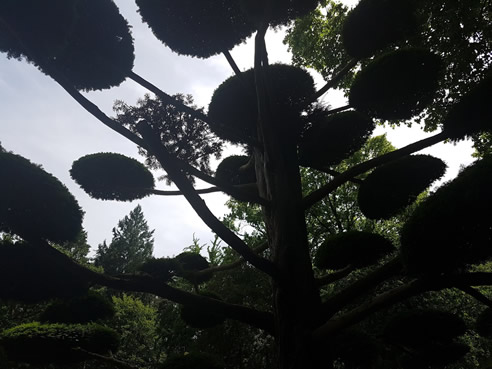
I found the trip to be a great opportunity to write and to reflect upon my writing. In the workshop ‘Reimagining, Rewriting, Reinterpreting a Work’, I reworked the phrases we were provided with as stimuli, and was particularly pleased with the line: Can you imagine the number of trees Kraftwerk have seen in the dark? Whilst I was glad of the opportunity to write, and found some of the content interesting, I was a little disappointed that this workshop didn’t take advantage of the variety of new people all brought suddenly together. Our trip to the Oriental Garden proved inspiring. We were set the task of writing a poem whilst in the gardens, and were encouraged to engage our senses and leave the intellect behind. This set me thinking about how interlinked sensory experience and the intellect are. As if one can’t experience and think at the same time? The pieces I composed reflected on this. The first of these pieces was written about a video I took of the Koi fish in the park, and I’ve since worked this into a poetry film. Poetry Film is an art form I hope to engage with more, an avenue that’s been opened up to me by the trip.
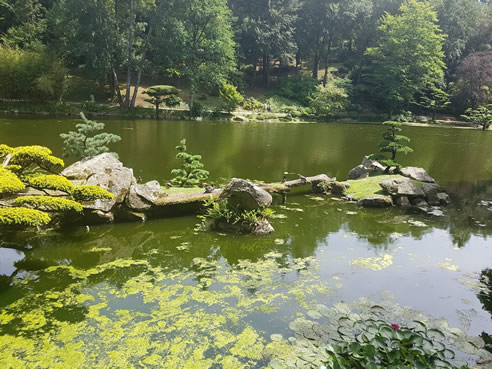
smartphone held steady,
Koi unsettle the water
I stand to capture
what do they see, these
oriental ghost-fish who
haunt my SD card?
no sense without reflection
*
2b or not 2b
(an abstract haiku
by a blind mathematician)
2b’s the result
of the equation, what is
a crysanthemum?
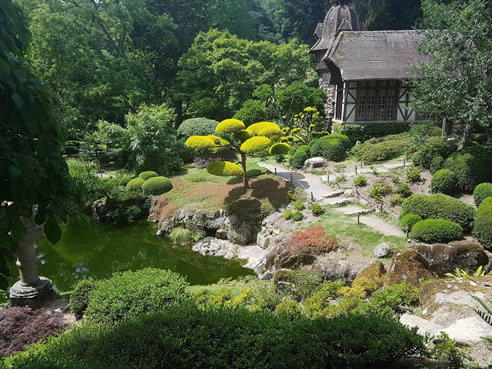
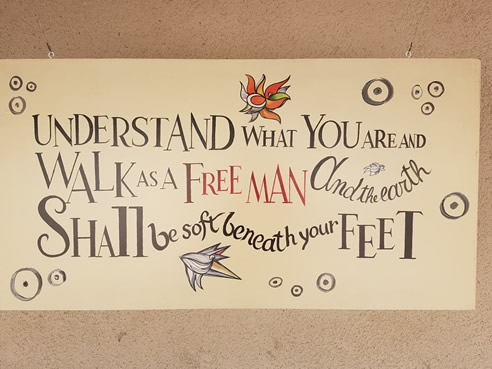
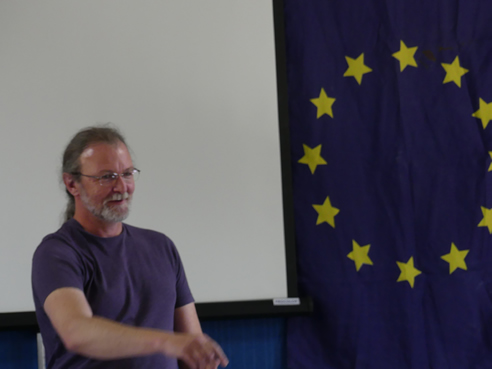
Our second ECIC excursion went particularly well. The setting and logistics were well organised, not to mention the fine weather. The accommodation was excellent, with six of us sharing two gîtes at Moulin de l’Arche. I enjoyed being able to spend time with more of the Ó Bhéal board members and regulars and to see them shine in an international setting, amid participants from 14 countries. We are very fortunate in Cork to boast such an amount of talent. Colm, Shaunna, Ciarán, Michelle and Ben all impressed and did us proud.
The only issue we had really, was being located in remote carnivore country with vegans and veggies in tow, though we worked around all that and the spirit of the Ó Bhéal poets was such that any cultural differences became points of interest and debate rather than anything else. The spirit of the festival generally was very positive. Needless to say the village ladies were well-educated as to the specifics of vegetarianism and veganism by the time the week was drawing to a close. With Maureen’s van at hand, we were able to zoot off and sort ourselves out with specific dietary needs when needed, while the meat eaters among us were well sated every day.
There were a number of workshops which went well by all accounts, while the steering meetings were productive and economical, which we all appreciated. I particularly enjoyed presenting Ó Bhéal’s programme bilingually, to a very forgiving French audience. It was a treat to screen our poetry films in a proper cinema, full-screen with surround sound, while the lack of French poetry-films became glaringly obvious (we have plenty in the other latinate and European languages). We receive entries from approx. thirty countries each year, yet the only French language poetry-film we have was made in the Ukraine. Something to take home and consider for the competition’s promotional strategy.
I certainly learnt a lot about running a community-driven festival in a remote area. There are certainly parallels with the demands we face in a city like Cork, venue and space related mostly. Having a significant musical element within a literary festival proved itself to be beneficial on many levels, so in our evolution of the Winter Warmer festival, we hope to take a number of lessons on board. The level of inclusivity was particularly impressive, with a strong outreach element for the youth and artists with disabilities. And with Maureen’s organisational experience and long reach across Europe, this was certainly one of the most multicultural festivals I’ve attended.
Serendipity would have us meet a particularly vibrant and talented group of Welsh musicians from the Welsh Connection collective, all hailing from Swansea, a twin city of Cork’s. Poetry and music melded late into the nights as did new friensdships which has already promised to pay off with direct twinning exchanges in the near future.
Our hosts were a lesson in themselves, all extremely kind and welcoming. Our warm thanks go to Maureen and Dennis Walby, Gigi and Jean Pradillon, John Eliot and Jill Pope, to Suzy and Tony Witten our hosts, and to all the village men, women and young enthusiasts who helped to make our stay and the Voulmentin festival one to remember.
